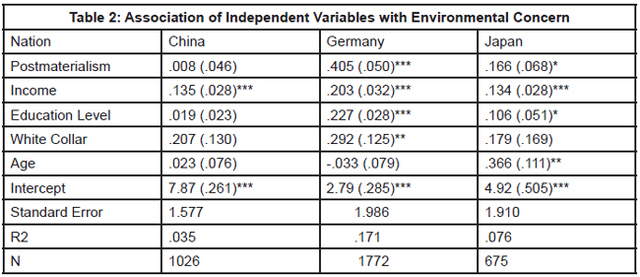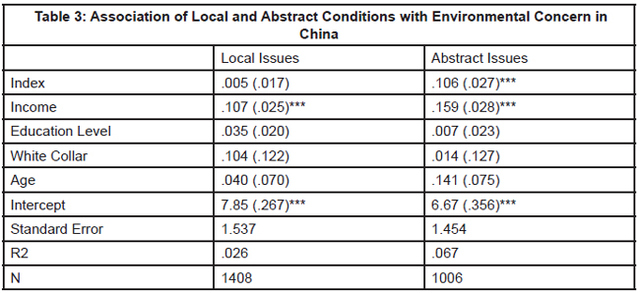From Clocks and Clouds VOL. 3 NO. 1Environmentalism and Postmaterialism in China
By
Clocks and Clouds 2013, Vol. 3 No. 1 | pg. 1/1
IN THIS ARTICLE
KEYWORDS
AbstractPostmaterialist values, those that emphasize higher-order human needs, have become widely accepted as the determining force behind environmentalism in the West. Little research has been dedicated to studying the importance of these values outside of the developed world where experience with pollution has been the assumed cause for people's concern for the environment. This study seeks to expand the understanding of ecological concern in China by testing the values-based theory of environmentalism in China. Using survey data taken from the World Values Survey, this study finds no evidence of a relationship between postmaterialist values and environmentalism in China. Instead, it finds that widespread environmentalism there may not be the result of objective environmental conditions but the result of other cultural factors not shared by Western societies. This study thus addresses a gap in the understanding of ecological concern in China and suggests topics for future scholarship. This research also highlights the potential importance of cultural values in studying environmentalism in developing nations. IntroductionIn recent years, the topic of environmental concern has grown as an area of inquiry, beginning with the rise of environmentalism in the West during the later decades of the twentieth-century. Early scholarship treated environmental concern as a luxury good only available to citizens of the wealthy industrialized world, and postmaterialist values eventually emerged as the primary explanatory variable for ecological concern in the West. When environmentalism began to appear as a political force in developing nations, it was described as a materialist response to devastating ecological degradation, and a wholly distinct phenomenon from the postmaterial environmentalism in the developed nations. As a result, values in less industrialized nations generally have not been considered and little research has been dedicated to the subject. China, despite its growing power and status as an advanced developing nation, is one of those places in which environmentalism is poorly understood. As China is the world's most populous nation and its second largest economy, environmental attitudes there may have profound effects on global efforts to address severe ecological threats. This is especially true on the issue of climate change, as China has fiercely resisted emissions limits.As the Chinese regime has moved away from the ideological-based legitimacy of the past, it has taken care to be more perceptive of newly-important public opinions. Accordingly, popular attitudes towards environmental protection in China may play a very significant role in the continuing rounds of climate talks. Even on issues seemingly within China, the nature of pollution ensures that internal policies will have broad effects on the state of the global environment. Furthermore, the potential for environmental concern and destruction to affect the standing and legitimacy of the regime continues to grow as China eschews Communism in favor of state capitalism. A better understanding of environmentalism in China may also prove valuable in studies of other industrializing countries as they reach more advanced levels of development. To contribute to the limited research on environmental attitudes in China, this study seeks to examine the role of values, specifically postmaterialism, in shaping concern. Postmaterialist individuals place great importance on the higher end of Maslow's hierarchy of human needs. Included among these concerns are morality, autonomy, expression, aesthetics, and quality of life. Postmaterialists, as a result of continued abundance, take for granted basic human economic needs such as health, safety, and sustenance that are lower down on the hierarchy. Environmentalism can be connected with postmaterialism through the significance postmaterialists place on the aesthetics of the natural world and on the broader effects of human activity. Postmaterialists value the environment beyond simple economic utility and see it as deserving of protection in spite of short-term costs. This type of concern does not require individuals to have experiences with pollution, and it includes issues that have little or no direct effect on the individuals' lives. Because China is an advanced industrialized country that has experienced three decades of continual development, postmaterialist values have likely taken hold in China to the point that their effect on environmentalism can be studied. As a result, this study seeks to examine the hypothesis that postmaterialism is directly related to environmentalism in China. Literature ReviewEnvironmental concern first emerged as a political force in Western Europe and North America in the mid-twentieth century. As a result, environmentalism was initially considered a luxury good, only available to affluent societies that had already undergone the often pollution-intensive process of creating an industrial society. Dunlap, Gallup, and Gallup (1993) examined this relationship by analyzing the results of the global Health of the Planet Survey. This study compared national-level data on environmental attitudes and gross national product. While some differences were seen in comparing affluent to developing nations, namely the level of support for higher prices to pay for regulation, environmental attitudes were found to be largely consistent across the developing-developed gap. Hence, this analysis suggested that environmentalism was more than just the prerogative of postindustrial societies, and that affluence was not a proper way to examine these values. In a later study of global polling data, Franzen (2003) also examined the relationship between affluence and environmental concern. Noting the assertion that economic prosperity is required for ecological concern was, as in the above scholarship, the subject of considerable debate, the author sought to contribute by comparing changes in environmental concern to changes in affluence over time using national-level data. From his research, Franzen found that environmentalism was only weakly correlated with affluence. Additionally, he found that economic growth had an extremely weak relationship with increases in ecological concern at the fringes of significance.Though affluent countries were shown here to have a high level of concern for the environment, changes in prosperity were found to not be a useful predictor of differences in such attitudes. Therefore, another feature of industrialized nations must be relevant in such analyses. As simple economic wealth failed to provide adequate power in explaining environmentalism, an alternative theoretical framework was proposed. In the seminal work on values in change, Inglehart (1995) targeted postmaterialist values as the driving force behind the emergence of environmentalism. This set of abstract cultural values is related to continued abundance and the author's explanation has gained widespread acceptance. Inglehart linked postmaterialism with favorable opinions of environmental protection, as policy action on the environment often hinders economic growth and productivity but is strongly linked with aesthetics and quality of life. Using the World Values Survey, Inglehart demonstrated that respondents espousing postmaterialist beliefs were more likely to favor efforts to protect the environment, even at the cost of economic growth. This pattern held true for both types of economies, but was much weaker in developing nations. Postmaterialism was also demonstrated to be concentrated in developed nations and to have emerged around the same time that environmentalism became widespread. Inglehart took care to note that these industrialized nations often lacked the severe environmental degradation seen in the developing world yet still expressed substantial levels of concern. Respondents in the developed world were therefore more likely to express negative sentiments on the global environment but have positive views of their local one. Inglehart also wrote that environmental conditions are able to explain the emergence of environmentalism in largely materialist societies. As postindustrial societies transitioned to their current state, pollution-intensive industries were largely moved to the developing world. As such, these countries have experienced high levels of ecological damage. Citizens of these heavily polluted nations, generally in the industrializing world, were found in this analysis to express greater levels of concern for the environment.In a reversal of an aforementioned relationship, these respondents were more likely to have a negative view of their local environment but care little for the state of the larger global one. A comparison of these two factors was inconclusive due to the limited availability of environmental data. In general, it did appear that both cultural and objective factors had roughly equal effects on the development of environmentalist attitudes but were rarely, if at all, important in the same society simultaneously. This important addition, however, addresses the main criticism of the postmaterialist theory of environmentalism by establishing how it can result from objective ecological conditions. Building upon the cultural framework laid out in Inglehart, Lee and Norris (2000) looked at postmaterialism in Eastern Europe, as most in-depth analyses had hitherto been focused on North America and Western Europe. This study used the World Values Study to compare patterns that had been demonstrated in the West with those in the region. In general, the authors found that the same demographic relationships with environmentalism observed in the West held true in Eastern Europe across national lines. These demographic factors, namely education, wealth, and youth, can be connected to postmaterialist values, especially in the transitioning societies of the former Eastern Bloc. Again, postmaterialism was found to be strongly correlated with environmental concern. These results provided evidence to support the existence of a correlation between postmaterialist values and ecological concern in an advanced developing nation like China. Cultural factors were also explored in Sarigollii (2009). This study compared environmental attitudes between the capitals of developing Turkey and postindustrial Canada. Residents of more polluted Istanbul were found to express a greater level of concern for the state of the environment than residents of Montreal in an analysis of original survey data. This result affirmed the importance of objective conditions. Strongly postmaterialist Montreal, however, was found to have a largely consistent level of environmentalism while such attitudes varied widely in Istanbul. In Turkey, the educated and wealthy respondents who generally expressed greater levels of postmaterialism were also more likely to express concerns over the state of the environment. This study provided further support for the possible significance of postmaterialism in advanced developing nations, among the other cultural factors considered. In Pierce (1997), this values-based framework was critiqued using national-level survey data. The author demonstrated that wealthy nations such as Japan may demonstrate a greater level of concern for the state of the environment than other developed countries despite having fewer postmaterialists in its population. Accordingly, Pierce wrote that other cultural factors, such as traditionalism and religion, can have important implications for the study of these attitudes. Care is taken to support the use of postmaterialism as an explanatory variable for environmentalism. The author argued that unique aspects of national culture, however, should be considered if they have the potential to work with or against the widely-supported link between postmaterialism and environmentalism. A recurring theme in the literature on global environmental attitudes is the relative lack of in-depth and individual-level research done on developing nations. Instead, early scholarship focused only on Western nations or a larger cohort in a comparative framework. More recent research, such as Lee and Norris (2000), has begun to focus on emerging economies. Despite recently surpassing Japan as the world's second largest economy and being the most populous nation on earth, China remains a relatively new territory for research on environmentalism. Chung-en Liu and Leiserowitz (2009) presented findings from one of the first publicly- available nation-wide surveys on environmental attitudes conducted in China, completed in 2007. In general, the survey found widespread support for the protection of the environment, with respondents expressing a preference for such efforts over unfettered economic development. Those surveyed also expressed optimism on the potential for improvement in the local environment over the coming year and a greater level of concern for provincial conditions over global ones, including issues such as climate change. Surprisingly, respondents generally reported contentment with the quality of their local environment despite living in some of the world's most polluted cities. The positive perceptions of the immediate environment suggest that the objective conditions theory alone cannot explain ecological concern in China, even with its localized focus. Cao, Chen, and Liu (2009) provided a deeper analysis of environmental attitudes in China, focusing on specific demographic factors. This analysis found that an overwhelming majority of respondents agreed that their nation was undergoing “severe environmental degradation” and that these conditions had negative implications for their health. Despite this fact, only around half of the respondents stated that protectingthe environmentwas more important than economic growth. Stronger environmental attitudes were associated with higher education levels, white collar professions, and both high and low incomes. An analysis of limited geographic data also suggested greater concern in areas of China expected to be more polluted. While this fact, combined with the ambivalence of regulation vis-a-vis growth and the respondents' belief that pollution has pernicious health effects, implies the strength of the objective conditions framework, the high levels of concern expressed by wealthy, well-educated, and professional Chinese suggests that values may also be of consequence. It is these very people who would be expected to be the most postmaterialist in Chinese society. The next step in the development of a comprehensive understanding of environmental concern in China is to investigate the postmaterialist values theory that has become the widely accepted standard in the field.Once this gap in the literature has been filled, the base for further, more sophisticated research on environmentalism, such as examining its salience as a political issue, will have been firmly established. As China is an advanced developing economy, an in-depth look at cultural factors of environmentalism may also provide insight to the applicability of values-based theories in other industrializing economies. Looking at the previous scholarship, it is clearly valid to test for a relationship between these two variables. Cao, Chen, and Liu (2009) have demonstrated that there is a high level of environmentalism expressed by the individuals most likely to be postmaterialist, mainly the young, educated, and economically secure. MethodologyThe hypothesis tested in the study was that, in China, individuals expressing postmaterialist values will also report a greater level of concern for the state of the environment, i.e. that the relationship so well-documented in the West will hold true. This hypothesis would be proven by a direct (and significant) relationship between the postmaterialism and environmentalism variables detailed below. On the contrary, the lack of a significant relationship between the variables, or an inverse one, would disprove the hypothesis. The data used in this analysis was taken from the most recent wave of the World Values Survey. For China, this data dates to 2007. Additional data used for comparative purposes was also taken from the World Values Survey for Germany (2006) and Japan (2005). The former was used to establish a baseline as a secure, highly-developed, prosperous Western nation, and to indicate the appropriateness of the model, while the latter was included to provide a different baseline, that of a highly-developed nation that also shares a similar cultural tradition to China. Postmaterialism was measured with an index calculated by the World Values Survey (see Appendix A). It is based on the respondents' answers to six questions about the desired goals of contemporary society. The six questions were divided over three sets of societal aims, with respondents directed toselectonlytwo. These sets included post materialist responses about protecting and expanding free speech, progressing towards a more humane and personal society, and increasing citizen input in important government decisions. Such concerns are quite clearly related not to basic human survival, but to the subjective human experience. These response sets also included standard materialist responses such as maintaining order, preventing inflation, and ensuring a strong national military. This group of potential responses is intimately related to meeting the base human needs of security and sustenance. The index score for respondents was then based on how many postmaterialist responses they chose in each of the three sets. The highest score individuals could receive was six (highly postmaterialist) while the lowest was zero (highly materialist). As the hypothesis the study sought to test was that postmaterialism is directly related to environmentalism, this variable was used as the primary independent variable (see below). While empirically measuring values is certainly a difficult proposition, the above approach was designed to capture a key aspect of postmaterialists: the tendency to emphasize and to exhibit a clear preference for higher-order concerns over lower ones. This was done by directly pitting obviously postmaterialist and materialist goals against one another. By taking into account the expressed preference for a variety of different goals across three sets thereof, this method was able to approximate how strongly postmaterialist and individual is. Because of the hypothesis of the present study, such differentiation is essential. And as China is a place where postmaterialist values are not yet universal, an index variable designed to measure postmaterialism over a range likely presented are more accurate representation of the population in question. Environmentalism was measured with an index based on the respondents' answers to three questions about environmental protection (see Appendix B). This set included the willingness to pay higher prices for the purpose of ecological protection, support for higher taxes to do the same, and the belief that such actions not cost citizens anything. For each question in the survey, respondents were able to state their level of agreement from "strongly agree" to "strongly disagree." For the first two questions, expressing “positive” concern for the environment was reversed coded so that agreement would increase the individual's index score. The composite variable was built by adding the scores for each question. The lowest score possible for respondents was three (least concern for environment) while the highest was twelve (highest concern). Based on the goal of examining the explanatory power of postmaterialism on environmentalism in China, this variable was used as the dependent variable (see below). The environmentalism index was designed to accurately portray the level of a respondent's concern for the environment. It is quite possible to envision, in isolation, nearly all respondents expressing at least some level of support for environmental protection. The outlined approach, however, attempts to discriminate amongst respondents by imposing hypothetical costs for policies to protect and improve the state of the environment. As with the aforementioned postmaterialist values, the use of three different questions with varying levels of support allows for a true range across individual respondents and can thus be effectively incorporated into the examination of this study's hypothesis. It must be noted here that central to this approach is the assumption that all environmentalists, no matter the cause, would be willing to bear hypothetical costs for environmental protection. This assumption is reasonable because a postmaterialist environmentalist would be expected prefer the benefits over the economic costs while a materialist environmentalist would be expected to safeguard health and survival, the most basic of concerns, through these costs. Demographic variables were included in this analysis as well. These factors have been shown in previous scholarship to be of some consequence in determining environmentalism in China and/or other regions. Education level and income were broken down into ten point indices by the World Values Survey, with educational attainment and high incomes associated with higher values respectively. A profession dummy variable was also created, with white collar professions being assigned a value of one. All cases were weighted using the computed variable provided by the World Values Survey. An additional set of two variables measuring perceptions of the local and global environment was prepared from the World Values Survey as well. These variables, and their use in place of postmaterialism in subsequent analyses as independent variables, are discussed in detail in the next section. To examine the relationship between postmaterialism and environmentalism, a multivariate regression analysis was performed. This statistical technique was selected due to the large ranges present in the two additive indices and the ability to control for the effects of variables demonstrated to be pertinent in prior research. With environmental concern as the dependent variable, postmaterialism, respondent age, education level, household income, and profession were selected as the independent variables. All statistical analyses were conducted using the IBM SPSS Statistics 19 software package. Results and AnalysisAs the above data demonstrates, China as a developing nation has not yet experienced the same level of acceptance of postmaterialism that Japan and Germany have after attaining industrialized status. China does, however, express a level of concern for the environment that is higher than in Japan or in Germany. While such a result would appear to call into question the theoretical framework for this study, it is important to note that the target relationships exist not in this aggregate national level data but instead at the individual level. * p < .05; ** p < .01; *** p < .001; y = β¬0 + β1(Postmaterialism) + β2(Income) + β3(Education) + β4(White Collar) + β4(Age) As shown in Table 2, postmaterialism at the individual level lacked explanatory power for environmentalism in China as it did not have a significant relationship with environmentalism. Accordingly, it can be said that environmental concern, clearly espoused by the Chinese people as seen in Table 1, is quite evenly diffused across the cultural boundaries created by postmaterialist values. As expected, postmaterialism as an independent variable in this model was significantly related to environmental concern in the other two countries included. This was particularly true for Germany, with postmaterialism having the greatest effect on environmentalism and the model overall having a rather robust R2 value of 0.17. The German results serve to indicate that the model applied above was appropriately designed as it adequately explained environmentalism in a nation where environmentalism is largely understood. It is apparent that this values-based explanation of environmentalism, strongly expressed in previous literature on the developed world, failed in China. As postmaterialist values fail to affect environmental concern significantly, the next logical explanation for environmentalism in China is the objective conditions theory. As severe ecological degradation can clearly become a devastating health hazard, not to mention an economic one, environmentalism can thus be the result of very materialist concerns of personal safety, and not that of cultural values. By all accounts, China is among the most polluted nations on Earth, the product of years of rapid economic growth and the relocation of heavily polluting industries and processes from Western postindustrial economies. If it is widespread environmental damage that causes the high level of concern expressed in China, then environmentalism would be expected to be observed across values- based boundaries. The above results do exhibit this pattern, with high levels of ecological concern that cannot be sufficiently explained by the regression model that was applicable to Germany and Japan. There is no readily available data to objectively measure local environmental conditions that could be compared to environmental attitudes in China.The World Values Survey did, however, include several questions asking respondents about both local and global environmental issues. Since it is the subjective experience with environmental conditions that drives materialist-based concern, these survey questions are an excellent proxy through which to examine the objective conditions theory. If objective conditions are the causal factor behind environmentalism in China, local ecological issues would be expected to be viewed in a negative light by respondents. Problems such as unsafe drinking water and poor air quality are intimately related to human health and are highly localized in scope. On the contrary, more abstract environmental issues such as climate change and biodiversity loss would likely be much less important to the materialist environmentalist, as they esoteric, if not minimal, effects on individuals and their well-being. Individuals that placed great significance on these issues are likely influenced by higher-order concerns than basic health and safety, and hence may express high levels of environmentalism despite having a positive perception of their local environment. To provide insight on the strength of the objective conditions framework in explaining ecological concern, a second set of regression analyses was performed. The World Values Survey set this data was taken from asked respondents whether they believed poor water, air, and sanitation, biodiversity loss, ocean pollution, and global warming are significant problems (see Appendix C). The six issues can be separated into two groups by virtue of being, with regard to individuals, local and concrete (the former three) or abstract and global in nature (the latter three). A local and abstract environmental issues index was calculated for each respondent by reverse coding and adding together survey answers to the aforementioned questions. These questions were selected for their specificity: the conditions-based theory of environmentalism is premised entirely on the proximity of environmental reality to the individual. Basing an index variable on inquiries as to concern for water, air, and sanitation quality, separately, was done to most directly probe this connection to environmental perception on those very aspects that relate most to human welfare. Each index had a range from three to twelve, with higher values associated with the respondent rating the presented issues as more serious problems. The indices were then used as independent variables in place of postmaterialism in the above statistical model. * p < .05; ** p < .01; *** p < .001; y = β¬0 + β1(local) + β2(Income) + β3(Education) + β4(White Collar) + β4(Age); As Table 3 demonstrates, concern about local environmental problems was not significantly related to environmentalism in China. Instead, expressed concern about abstract environmental problems was, to a high degree. This result serves to suggest that objective conditions may not be the dominant narrative, as the high level of ecological concern is not related to negative perceptions of respondents' immediate environment. The explanatory strength of abstract concerns supports a values-based framework, as efforts to address these issues likely involve economic costs that materialists would avoid without direct harm. In general, they are more a function of societal interaction with the natural world, divorced from the individual. While postmaterialism is an example of such a theory, its weakness as an independent variable suggests that other values are more important. The relevance of different cultural factors is also supported by statistical results for Japan. Though the data resembled that for Germany, the model overall was weaker here (R2=0.076), with postmaterialism being a more minor, albeit significant, variable in determining environmentalism (see Table 2). Hence, while Japan is comparable to Germany economically and in terms of objective conditions, ecological concern is somewhat different. Pierce (1997) argued that Japan, by virtue of cultural traditions, was unique among postindustrial economies is an excellent example of a nation in which the postmaterialist values theory lacks strength.As an East Asian neighbor, one that exerted great influence on the region for centuries, China has cultural traditions that are very similar to Japan, especially in comparison to the West. It follows then that relevant cultural factors beyond postmaterialism would be shared by the two nations. The likely importance of these other values implies that the objective conditions paradigm is not the overriding relationship behind environmental concern in China. Instead, subjective values outside of postmaterialism are supported as the possible explanation behind the dependent variable. Pierce (1997) called attention to the less individualistic nature of Eastern societies compared to Western traditions. Individualism, according to Pierce, leads to an anthropocentric worldview, one that sees the natural world as justly exploited for human needs and benefit. By subscribing to this viewpoint, one would be expected to place economic needs over environmental protection and see no inherent importance in such efforts. Because Eastern societies place a greater value on the community, they are more likely to see the environment as part of larger society and as a provider of shared goods, thus deserving of protection (Pierce 1997). It follows that communitarian individuals would likely express support for environmental ideas even in the absence of personal experiences with severe pollution, and be concerned with even abstract human effects on the natural world. Confucian values, shared in at least some form by China's neighbors, also may be able to explain environmental concern. Despite the efforts to expunge these cultural traditions, Confucian values have remained a powerful cultural force in China. As discussed in Snyder (2006), Confucian thought is well suited towards an anthrocosmic viewpoint, in which humans act in concert with nature. A harmonious relationship with nature is an essential component of this belief system. The great importance placed on moral relationships in Confucianism would thus lead individuals to see an inherent value in the natural world and seek to interact with it in a sustainable and just way. Like communitarian beliefs, this outlook likely leads to concern with impacts on the environment that are divorced from everyday life. ConclusionWith the inability of postmaterialism to explain the strong environmental concern expressed in the absence of postindustrial abundance in China, additional cultural values emerge as the possible impetus behind the strong level of ecological concern expressed in the World Values Survey. The ability to link Confucian belief systems and communitarian outlooks with environmentalism philosophically further supports this assertion. At the present time there is not enough sufficient data to allow for an empirical study of the effects of these Eastern values on environmentalism in China. This analysis does affirm, however, that culture must be a topic of further research to expand the knowledge of ecological concern in China. This study serves to highlight the shortcomings of the postmaterialist theory of environmental concern. Though the relationship has been well-documented in the Western world, it has been found to be less important to understanding environmentalism in East Asia. And although it is not unreasonable to predict that, as China continues to develop, such values may grow in stature, these findings suggest that postmaterialism may never be the driving force behind environmentalism there as it is in the West. Additionally, this study highlights the need to consider a broad range of cultural factors, many unique and not shared in the West, when analyzing such topics as environmentalism. Environmental concern in China may yet prove to have profound implications for the global environment and economy. Growth in environmentalism has the ability to propel the nation towards accepting emissions limitations, a key term that has kept the United States from signing on to any meaningful climate treaty. Internal regulations brought about by public pressure could also make doing business in China much more costly. Failure by the regime to adequately respond to potentially strong environmentalist sentiment may very well have a deleterious impact on its grip on power and help provide an impetus for more radicalized political actions, outside of tightly controlled Chinese politics. ReferencesCao, Shixiong, Li Chen and Zhande Liu. 2009. "An investigation of Chinese Attitudes Towards the Environment: Case Study Using the Grain for Green Project." Ambio (February): 55-65. http://www.proquest.umi.com Chung-en Liu, John and Anthony Leiserowitz. 2009. "FROM RED TO GREEN? Environmental Attitudes and Behavior in Urban China," Environment (Summer): 33-47. http://www.proquest.umi.com Dunlap, Riley E., George Gallup, and Alec M. Gallup. 1993. “Of Global Concern: Results of the Health of the Planet Survey," Environment (November): 6-15, 22-39. http://www.proquest.umi.com Franzen, Axel. 2003. "Environmental Attitudes in International Comparison: An Analysis of the ISSP Surveys 1993 and 2000," Social Science Quarterly (June): 297-309. http://www.proquest.umi.com Inglehart, Ronald. 1995. "Public Support for Environmental Protection: Objective Problems and Subjective Values in 43 Societies," PS: Political Science and Politics (March): 57-72. http://www.jstor.org Lee, Aie-rie, and James A. Norris. 2000. "Attitudes Towards Environmental Issues in Eastern Europe," International Journal of Public Opinion Research (Vol 12 No 2). http://www.proquest.umi.com Pierce, John. 1997. “The Hidden Layer of Political Culture: A Comment on “Postmaterialist Values and the Environment: A Critique and Reappraisal." Social Science Quarterly (March): 30-35. http://www.web.ebscohost.com Sarigöllü, Emine. 2009. "A Cross-Country Exploration of Environmental Attitudes," Environment and Behavior (Vol. 41 Issue 3): 366-389. http://www.proquest.umi.com Snyder, Samuel. 2006. "Chinese Traditions and Ecology: Survey Article,"Worldviews: Environment Culture Religion (Vol 10 No 1): 100-134. http://www.web.ebscohost.com AppendixSuggested Reading from Inquiries Journal
Inquiries Journal provides undergraduate and graduate students around the world a platform for the wide dissemination of academic work over a range of core disciplines. Representing the work of students from hundreds of institutions around the globe, Inquiries Journal's large database of academic articles is completely free. Learn more | Blog | Submit Latest in Environmental Studies |




















